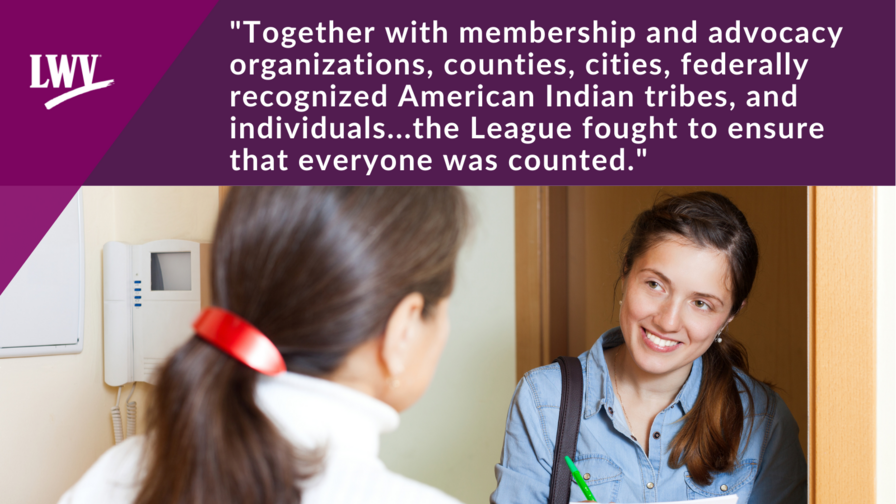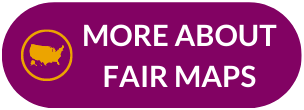How LWV Supports the Census
On September 16, 2021, the U.S. Census Bureau will deliver its final resources to states to use for redistricting.
The 2020 Census faced unprecedented and unforeseen obstacles in the face of the ongoing pandemic, natural disasters, and political pressure. The delivery of this final set of resources is the culmination of years of hard work by career staff at the US Census Bureau.
The Data Collection Process and LWV’s Support
It takes years to prepare for the census to begin. Before one census is completed, planning for the next one has already begun! The Census Bureau prepares for tabulating, protecting, and collecting the data that will go in their final reports. Through partnerships with organizations like the League of Women Voters, they get the word out about how to engage in the census and offer tools explaining the importance of taking part.
Like in years past, LWVUS was an official partner of the 2020 Census, helping to prepare and share tools and information to local and state Leagues as they engaged their communities. We participated in stakeholder meetings with Census Bureau staff and other coalition partners. Since the counting ended, we’ve stayed in contact with Census Bureau staff as they completed the data, and tackled issues around the privacy of individual data. We've also promoted the use of data in the creation of fair and representative maps in the 2021 redistricting cycle.
LWVUS also took steps to ensure that Congress is doing its part to ensure the success of the census. We have and will continue to support full funding of the US Census Bureau’s budget. At the height of the pandemic in 2020, we joined calls for added funding for the census to respond to the challenges created by COVID-19.
We also urged Senators to act by extending the timeline for the census to guarantee the Census Bureau the time they needed to collect and finalize data in time for its delivery to states to begin redistricting. Additionally, the League supported the timeline issue through legal action. LWV’s case, National Urban League v. Raimondo, was successful in preventing the federal government from severely cutting and skewing the results of the 2020 Census.
Together with membership and advocacy organizations, counties, cities, federally recognized American Indian tribes, and individuals representing a broad swath of US residents, including the historically undercounted populations who were most likely to be missed by a rushed census process — communities of color, low-income individuals, undocumented immigrants, residents of American Indian reservations, and persons with mental and physical disabilities — the League fought to ensure that everyone was counted.
In 2020, the League also challenged a directive from the Trump Administration to include a question related to citizenship status in the final questionnaire.
Drawing Fair Maps for the Next Decade
The release of the first data set through the Census Bureau’s FTP site in August kick-started the beginning of map-drawing in many states. On September 16th, states will receive data in an easier-to-use format. This data will allow us to build maps that are truly representative of our communities, speaking to our best interests in health care, education, and more — if we the people get involved.
Now is the time to ensure our district lines are drawn fairly. Do your part and join the League on our quest for People Powered Fair Maps™ today!
The Latest from the League
The League of Women Voters Board President Dr. Deborah Turner issued a statement ahead of the release of census data in its legacy format, officially marking the beginning of map drawing.
People Powered Fair MapsTM is a national redistricting program of the League of Women Voters focused on creating fair political maps nationwide. The program includes actions in all 50 states + D.C.
Because of COVID-19, the Census has been forced to propose changes to its operating timeline and the dates for sending data regarding apportionment and redistricting.
Sign Up For Email
Keep up with the League. Receive emails to your inbox!
Donate to support our work
to empower voters and defend democracy.







